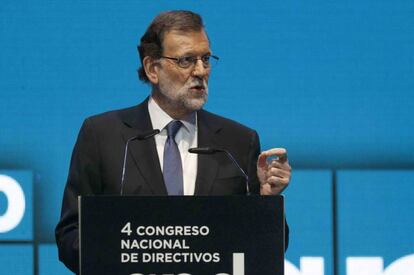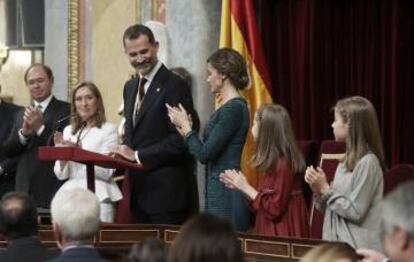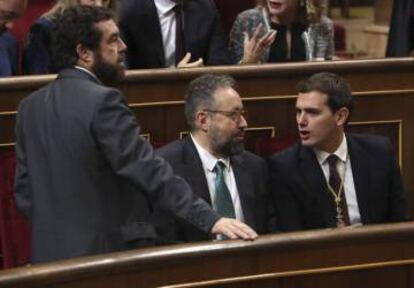Spaniards’ concerns about corruption soar under PM Mariano Rajoy
But surveys also show that Popular Party voters are less worried about political graft than others
A new poll confirms that since Prime Minister Mariano Rajoy first took office in 2011, concern over political corruption has ballooned to record levels, becoming Spaniards’ second biggest worry after unemployment. The latest Center for Sociology Studies (CIS) poll, conducted in October, shows that 37.6% of respondents feel corruption and fraud is one of Spain’s top three problems.

This is a significant drop from the historical high of 63.8% in November 2014, when the first Rajoy administration had passed the mid-term mark. But it is still a spectacular increase from the 5.4% of respondents who gave a similar answer during the last month of José Luis Rodríguez Zapatero’s Socialist administration, in late 2011.
Even the Spanish king mentioned corruption last week, when he officially inaugurated the new political term with a special address in Congress: “Corruption, which has incensed public opinion across our country and which needs to keep being firmly fought, should become a sad memory of a scourge that we need to conquer and overcome.”
There’s been a few small steps forward, but excessively modest given the scope of the problem
Fernando Jiménez Sánchez, Murcia University
Experts say that attitudes about corruption are linked to the economy.
“This increase [in people’s concern about corruption] is due mostly to two things,” says Fernando Jiménez Sánchez, a political science lecturer at Murcia University and member of the Council of Europe’s Group of States Against Corruption (GRECO).
“First, the greater visibility of corruption after the almost endless waves of scandals and news coverage of related inquiries or trials. And second and most importantly, because of the crisis. People, whether here or anywhere else, tend to be less lenient with such behavior in times of hardship and adjustment than in boom times.”

The Popular Party (PP) administration has been tainted by a raft of scandals affecting the Spanish conservatives, including the Gürtel, Púnica, Bárcenas and Taula cases. Dozens of elected officials are being investigated or tried for crimes ranging from graft and patronage to illegal party financing.
While these scandals were breaking, Spaniards were also laboring under a 25% jobless rate, a soaring premium rate on sovereign debt, a 10% loss on wage purchasing power, thousands of home evictions, soup kitchens filled to capacity, and a record number of households with every member out of a job.
Still a winner
Yet the PP still managed to garner the most votes at the last two national elections despite losing its absolute majority.
The Center for Sociology Studies (CIS) has an explanation for this paradox: PP voters are less concerned about corruption than people who vote for other parties.
Juan Jesús González, who teaches sociology at the university for distance learning UNED, adds that “PP voters vote with a focus on the economy; corruption is not part of their calculations.” He also underscores “the tolerance for corruption as a hallmark of political culture in Spain.”
Polls seem to confirm this assertion. A recent survey showed that 28.2% of PP voters named corruption as one of Spain’s top-three problems, compared with 44.9% of voters for the anti-austerity party Podemos, 41.1% of voters for emerging center-right party Ciudadanos and 39.6% of PSOE voters.
Corruption should become a sad memory of a scourge that we need to conquer and overcome
Felipe VI of Spain
Ultimately, experts say that voters tend to put the economy ahead of corruption on their list of priorities.
“Voters have come to identify corruption with the political class in general, independent of this party or that party,” says Jesús Lizcano, a spokesman for Transparency International in Spain. “They think they [politicians] are all the same, which is why they don’t really discriminate at the polls based on this variable. In many cases, people base their voting decisions on some other variable that could be ideological, social or economic.”
Elusive trust
And now that the PP is back in power thanks to a Socialist abstention at a congressional vote in late October, little progress is expected.
“There have been a few small steps forward, but they are excessively modest given the scope of the problem,” says Jiménez Sánchez. “With what’s been done, it’s impossible to recover citizens’ trust in their political institutions.”
This expert has a set of recommendations to improve the quality of politics. “First, end the sense of impunity around corruption, which entails reinforcing the system of checks and balances of the political system. Second, reduce the possibilities for corruption by reducing the number of regulations and laws and making these better, depoliticizing and professionalizing the upper echelons of public service, extending transparency in the public sector, evaluating the real impact of public policy, and affording effective protection to corruption whistleblowers.”
Not enough

People blame politicians for the current state of affairs: 80% feel that the government is doing a poor job fighting corruption, according to a survey by Transparency International. No other EU state has such high disapproval ratings.
What’s more, 55% of respondents said they believe that most of Spain’s Cabinet is involved in illegal activities. This was part of the reason why the PP had so much trouble finding allies to form a government. In the end, the protest party Ciudadanos agreed to a deal on one condition: getting Rajoy to sign a six-point anti-corruption declaration.
But will it be enough? “It doesn’t get to the heart of the problem,” says Sánchez Jiménez.
English version by Susana Urra.
Tu suscripción se está usando en otro dispositivo
¿Quieres añadir otro usuario a tu suscripción?
Si continúas leyendo en este dispositivo, no se podrá leer en el otro.
FlechaTu suscripción se está usando en otro dispositivo y solo puedes acceder a EL PAÍS desde un dispositivo a la vez.
Si quieres compartir tu cuenta, cambia tu suscripción a la modalidad Premium, así podrás añadir otro usuario. Cada uno accederá con su propia cuenta de email, lo que os permitirá personalizar vuestra experiencia en EL PAÍS.
¿Tienes una suscripción de empresa? Accede aquí para contratar más cuentas.
En el caso de no saber quién está usando tu cuenta, te recomendamos cambiar tu contraseña aquí.
Si decides continuar compartiendo tu cuenta, este mensaje se mostrará en tu dispositivo y en el de la otra persona que está usando tu cuenta de forma indefinida, afectando a tu experiencia de lectura. Puedes consultar aquí los términos y condiciones de la suscripción digital.









































